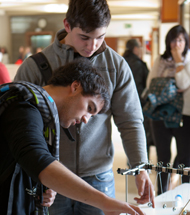Chemistry and war, DNA and superheroes, love and nature, mysteries and cells, and why the planet of the apes will never be possible.
The University offers 5 lectures by knowledge dissemination, guided tours of the Museum of Natural Sciences and CIMA and experiments during Science Week.

PHOTO: Manuel Castells
This Wednesday, November 8, begins at the University of Navarra the Science Weeks 2017, which this year will feature five talks of knowledge dissemination open to the public on topics as diverse as the Chemistry related to war or the revolution in the modification of DNA taking as an excuse some superheroes. These talks will take place on November 8, 9, 10, 13 and 14 at 12:30 pm at auditorium of Sciences Building.
In this same building, on the fifth floor, there will be daily tables with experiments that invite attendees to touch Biology -through sampling techniques and capture of animals for study-, Physics -with experiments related to StarWars on light and its "dark side", infrared and ultraviolet light-, and Physics -with fireworks, homemade flares or gunpowder cotton-, as well as Microbiology workshops to observe crops or show the importance of bacterial resistance. Chemistry -The program also includes Microbiology workshops to observe cultures or to show the importance of bacterial resistance. All this to position of teachers and students of doctorate of the School of Sciences.
Guided visits will also be organized throughout the week to the Museum of Natural Sciences of the academic center - where more than 1 million museum records and 25 million specimens are kept - and to the research center Applied Medicine (CIMA).
This annual event -which is now in its 17th edition issue and is coordinated by the Friends of Science Club- has been presented at the Pamplona Planetarium, with the participation of its director, Javier Armentia; Ignacio López-Goñi, director of the Science Museum of the University of Navarra; Ramón Gonzalo, Vice President of research of the Public University of Navarra; and Nieves Gordón, vice president of the Friends of Science Club. Likewise, the official inauguration will take place on Monday 13th at 5:30 p.m. at place del Castillo with the traditional experiment tables for all audiences.
"Surrender or I'll bust you!": Chemistry history of war."The first of the five informative talks for all audiences will be held on Wednesday, November 8 under the degree scroll "Surrender or I'll blow you up!: Chemistry history of war". In it the professor of Degree of Chemistry and popularizer José Ramón Isasi will explain, through experiments, the evolution of weaponry from antiquity until now: "We will begin in the age of metals with the finding of steel, we will continue with the first uses of gunpowder and the development of modern explosives, to conclude with chemical and nuclear weapons. All this while introducing concepts such as ignition, deflagration, detonation, etc. illustrated with some controlled but somewhat noisy experiments," explains the professor.
position On Thursday 9, lecture will be given by Professor Íñigo Izal, who will talk - in "Molecular tools for the study of the genome" - about the great advances that await us in the field of molecular biology and Genetics using several superheroes as a metaphor for the manipulation of DNA. The talk on the 10th, on the other hand, will also use the trajectory of some nature lovers to talk about environmental ethics, by Professor Jordi Puig.
On Monday 13th in "The cell is also cool", Professor Marian Burrellexplain how despite technical advances to observe the cell in ever greater detail, in doing so more and more novelties continue to be discovered. Finally, on Tuesday 14, the last session, "The Impossible Planet of the Apes" will allow the professor of Genetics Javier Novo to unravel the evolutionary process and clarify why it is impossible that today's monkeys will one day become humans.
